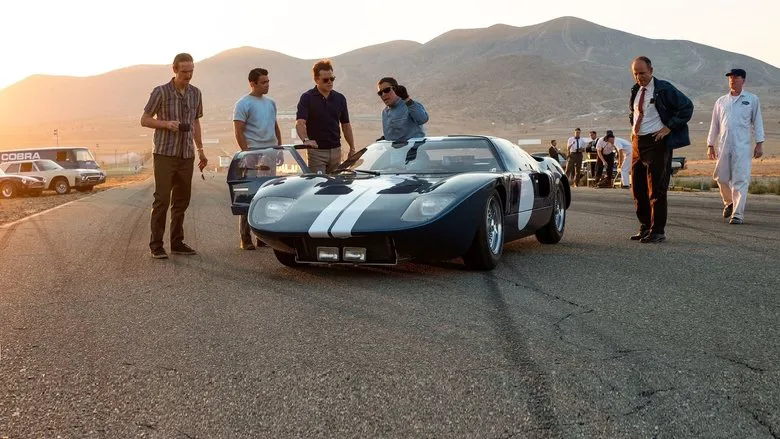Ford v Ferrari: A High-Octane Journey Through Grit and Ambition
“Start your engines!” As the starting flag drops, the scene explodes into a maelstrom of motion: drivers leaping into their roaring machines, tires shreiking in protest, and an immediate, furious scramble for a coveted position. This electrifying pandemonium sets the stage for the 24 Hours of Le Mans, an unforgiving crucible of speed, strategic prowess, and sheer human endurance. James Mangold’s masterfully directed “Ford v Ferrari” not only depicts this legendary race but also mirrors its very essence, striving for a dynamic equilibrium between a relentlessly paced narrative and the unyielding resilience of its protagonists. While the grand spectacle of the actual race climaxes in the film’s exhilarating third act, the true narrative prowess of the film lies in meticulously detailed and arduous preparation that precedes the famed starting line. It’s an inspiring chronicle of how Carroll Shelby, a fiercely driven and visionary automotive designer portrayed with charismatic precision by Matt Damon, and Ken Miles, a magnificently fearless yet temperamental driver brought to life with raw intensity by Christian Bale, united their distinct passions under the formidable banner of the Ford Motor Company. Their singular, audacious goal: to conquer the ultimate endurance race, Le Mans, and redefine automotive history.

Having made its auspicious debut at the Toronto Film Festival, “Ford v Ferrari” roaringly entered the demanding awards season landscape with clearly defined and undeniable ambitions. Mangold, a director with a keen eye for compelling storytelling, meticulously crafted a film that adheres to a time-honored, often Oscar-winning formula: an absolutely gripping true story, featuring powerhouse A-list actors in pivotal leading roles, and a narrative deeply fueled by profound personal sacrifice and unwavering, almost obsessive, commitment. From its opening moments, the film pulsates with an infectious, gasoline-fueled energy and showcases absolutely stunning technical prowess, making it remarkably captivating even for audiences initially indifferent to the intricate world of global automobiles and motorsports. “Ford v Ferrari” deftly weaves together elements of biopic, intense drama, charming comedy, and classic buddy-movie tropes. Yet, remarkably, it resists being neatly categorized into any singular genre. Instead, each disparate component is seamlessly integrated, blending together with sublime precision to forge a cohesive, emotionally resonant, and undeniably powerful cinematic experience that transcends simple labels.

The Rivalry That Forged a Legacy of Innovation
At the very core of this cinematic machine, serving as its roaring engine, is the gripping, real-life rivalry between two titans of the automotive industry. Henry Ford II, finding his empire facing the daunting challenges of declining sales figures and a somewhat tarnished corporate reputation, initially sought a strategic merger with the illustrious Italian marque, Ferrari. However, when the highly anticipated deal dramatically collapsed at the eleventh hour, partly due to old Enzo Ferrari’s unwavering control over his racing division, the scion of Detroit royalty was fueled by a fierce, personal vendetta. He resolved to seek an unprecedented form of revenge: to utterly dethrone Enzo Ferrari, who had reigned supreme over Le Mans for years, by beating him on his own tarmac. To realize this seemingly impossible ambition, Ford enlisted the strategic prowess of Carroll Shelby, a former Le Mans winner himself, possessing a unique blend of racing insight and business acumen. In turn, Shelby, recognizing true genius, recruited Ken Miles, a truly brilliant but notoriously temperamental driver and mechanic. Despite his often-blunt demeanor and distinct lack of boardroom diplomacy, Miles possessed an almost uncanny, intuitive ability to diagnose even the most subtle flaws in the nascent FORD GT 40 simply by the nuances of its engine’s unique roar.

The path to Le Mans was not paved exclusively with high-octane glory but also fraught with corporate obstruction and grueling technical challenges. Before any wheel could touch the legendary French track, Shelby and Miles faced relentless internal battles, from bureaucratic red tape dreamt up by skeptical Ford executives to the formidable task of transforming a promising prototype into a championship contender. The sheer dedication and countless hours spent by the pit crew and engineering teams, pushing the limits of technology and human endurance during rigorous test runs, are depicted with a visceral authenticity that makes the audience feel every high-speed turn and every wrench tighten.

Miles’s unparalleled sensitivity to the car, his ability to communicate with the machine almost as if it were an extension of his own body, proved indispensable. His brilliant, unconventional methods often clashed with the rigid corporate structure, but ultimately, his insights were critical to refining the Ford GT40 into a competitive beast worthy of taking on Ferrari’s dominance.

Beyond the Finish Line: A Saga of Honor and Sacrifices
Beyond the roar of engines and the blur of speed, “Ford v Ferrari” masterfully explores the deeper, more profound conflict between fiercely individual ambition and the broader, often uncompromising, collective goals. Mangold delves deftly into timeless themes of deeply held principles, the pursuit of glory, the often-painful necessity of compromise, and the sheer indomitable human courage, presenting them in a style that feels both classically epic and refreshingly direct. While the film unreservedly embraces a distinctly masculine energy and perspective, it admirably steers clear of any toxic masculinity, instead reserving its critiques for the excesses and cold calculations of unchecked capitalism. At its very beating heart, “Ford v Ferrari” is a profound tale of multifaceted honor, echoing ancient mythological narratives where a dedicated man must achieve a heroic, seemingly impossible feat to truly define himself and secure his place in history.

The film fluidly shifts gears with masterful precision, transitioning seamlessly from exhilarating, high-stakes race sequences that leave audiences breathless to intimate, tender moments, such as Ken Miles patiently sharing his invaluable knowledge of driving and life with his adoring young son. These heartwarming interludes are punctuated with tense, high-stakes boardroom meetings where corporate titans clash, and blistering high-speed test runs that push both machine and driver to their absolute limits, all culminating in the ultimate, grueling challenge at Le Mans. Katrina Balfe delivers a powerful performance as Ken Miles’ wife, Molly. She is depicted not merely as a supportive presence but as an exceptionally strong and fiercely independent woman who, given the chance, could undoubtedly outpace any driver on the circuit, embodying the quiet strength behind the men.
Christian Bale, true to his unparalleled reputation, delivers yet another profoundly transformative and utterly captivating performance as Ken Miles, thoroughly immersing himself in the complexities of the character. Matt Damon, equally compelling, captures the nuanced essence of Carroll Shelby with remarkable accuracy, embodying his charisma, shrewdness, and underlying drive. However, despite their individual brilliance, a subtle ingredient seems to be missing: the electrifying, almost indefinable on-screen chemistry between the two actors, and ultimately this elusive “magic of cinema,” is the only element that somewhat holds “Ford v Ferrari” back from potentially reaching its absolute zenith and conquering the awards race. James Mangold, a director renowned for his incredible versatility across genres (from the gritty realism of “Logan” and “3:10 to Yuma” to the charming period piece “Kate & Leopold”), has once again crafted a technically flawless and meticulously executed film. Yet, despite its almost surgical precision and undeniable technical mastery, it perhaps lacks the wild abandon, the daring spirit, or the truly visionary audacity required to ascend to the status of a true, undisputed cinematic legend. While “Ford v Ferrari” may not achieve earth-shattering historical significance in film theory, it unquestionably remains an exceptionally conscientious, brilliantly executed, and immaculately well-made film. More importantly, it serves as a powerful and enduring reminder that in the grand race of life, participation with unwavering integrity and honor is, at times, just as profoundly important as the singular act of winning.
